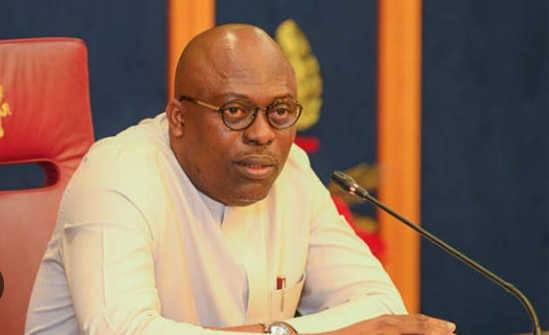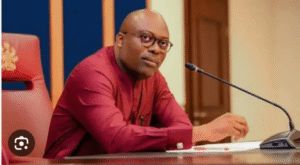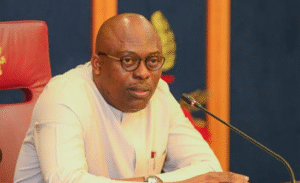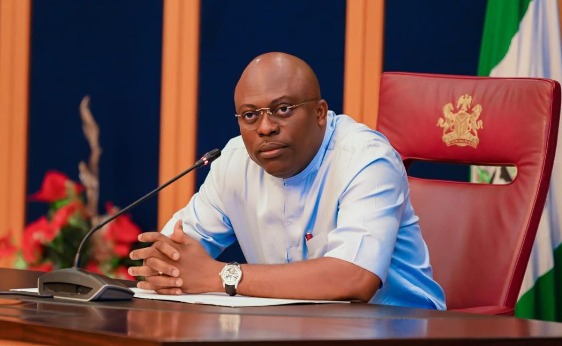
Governor Fubara Dissolves Rivers State Pensions Board
- Nigeria News
- 27.09.2025
- No Comment
- 23
Governor Fubara Dissolves Rivers State Pensions Board
Breaking News: Rivers State Pensions Board Dissolved
The Governor of Rivers State, Siminalayi Fubara, has approved the immediate dissolution of the Rivers State Pensions Board. The announcement, which came on Friday, marks a significant administrative decision by the Fubara-led government since the end of emergency rule in the state.
In a statement issued by the Head of Service, Dr. (Mrs.) Inyingi Brown, the Governor directed that the functions of the dissolved board will henceforth be handled by the Office of the Accountant General of Rivers State. This move is expected to streamline the state’s pension administration and improve efficiency.
According to the official press release, all members of the defunct board have been instructed to hand over all properties and assets belonging to the board to the Director of Administration in the pensions office immediately. This directive forms part of the state government’s effort to ensure a smooth transition of responsibilities from the dissolved board to the Accountant General’s office.

Furthermore, the statement noted that the Governor would, in due course, constitute a new board to oversee pension matters in Rivers State. This is seen as a proactive step to reform pension management in the state.
The Rivers State Pensions Board was responsible for managing pensions and retirement benefits for public servants in the state. However, it was not among the boards reconstituted by the immediate past emergency rule administration. This dissolution by Governor Fubara represents the first major administrative reshuffle since the conclusion of the six-month emergency rule.
Pension management has historically been a sensitive issue in Nigeria, often marked by delays, underfunding, and administrative bottlenecks. By shifting the responsibilities to the Accountant General’s office, the government aims to centralize and streamline operations.
Although the state government has not provided detailed reasons for the dissolution, sources within the administration suggest that the move aligns with Governor Fubara’s broader reform agenda. Centralizing pension administration under the Accountant General could reduce duplication of duties, enhance transparency, and ensure better financial oversight.
This step also reflects Fubara’s desire to leave a mark early in his administration by addressing structural inefficiencies inherited from the previous government. By announcing a new board in the future, the Governor signals a commitment to pension reforms that prioritize retirees’ welfare.

The decision has generated mixed reactions among civil servants, pensioners, and political analysts. Some view it as a welcome development that could improve the disbursement of pensions, while others are cautious, waiting to see how effectively the Accountant General’s office will manage its expanded responsibilities.
Several stakeholders have called on the government to ensure that the transition does not disrupt ongoing pension payments. Retirees in Rivers State have also urged the Governor to expedite the constitution of the new board to guarantee long-term stability in pension administration.
For pensioners, the dissolution of the board could bring both opportunities and uncertainties. On one hand, the Office of the Accountant General is expected to improve payment timelines by leveraging its established financial infrastructure. On the other hand, the shift may temporarily slow down processing times during the handover period.
The Rivers State Government has assured the public that pensioners will not experience any delays in receiving their benefits during this transition. According to the Head of Service, the state remains committed to fulfilling its obligations to retired public servants.
Governor Fubara, who assumed office with a reform-oriented agenda, has been quick to make decisions aimed at restructuring the state’s governance. His decision to dissolve the Pensions Board is consistent with his emphasis on accountability, transparency, and efficiency in public service management.
Political observers note that this move also signals the Governor’s intent to consolidate control over key institutions in the state, ensuring that his administration can implement its policies without legacy bottlenecks from previous governments.
According to the official statement, the Governor will soon appoint a new Rivers State Pensions Board. The new board is expected to adopt innovative measures to improve pension administration, including digitizing pension records, ensuring prompt verification of retirees, and enhancing communication between the government and pensioners.
Additionally, the state government may introduce policies to address long-standing grievances of pensioners, such as backlog payments and harmonization of pensions for different categories of retirees.
Across Nigeria, state governments are grappling with the challenge of modernizing pension systems. Many states have moved to adopt the Contributory Pension Scheme to replace the old Defined Benefit Scheme. While Rivers State has made progress in some areas, stakeholders believe that more reforms are needed to ensure retirees receive their benefits without unnecessary delays.
By taking a bold step to dissolve the existing Pensions Board, Governor Fubara positions Rivers State to potentially lead by example in pension reforms if the upcoming new board introduces effective policies and technologies.
Key Takeaways
- Governor Siminalayi Fubara has approved the immediate dissolution of the Rivers State Pensions Board.
- The functions of the dissolved board will now be handled by the Office of the Accountant General of Rivers State.
- Members of the defunct board must hand over all assets and properties to the Director of Administration in the pensions office.
- The Governor plans to constitute a new board to oversee pension matters in the near future.
- This is the first major administrative decision by the Fubara-led government following the end of the six-month emergency rule.





